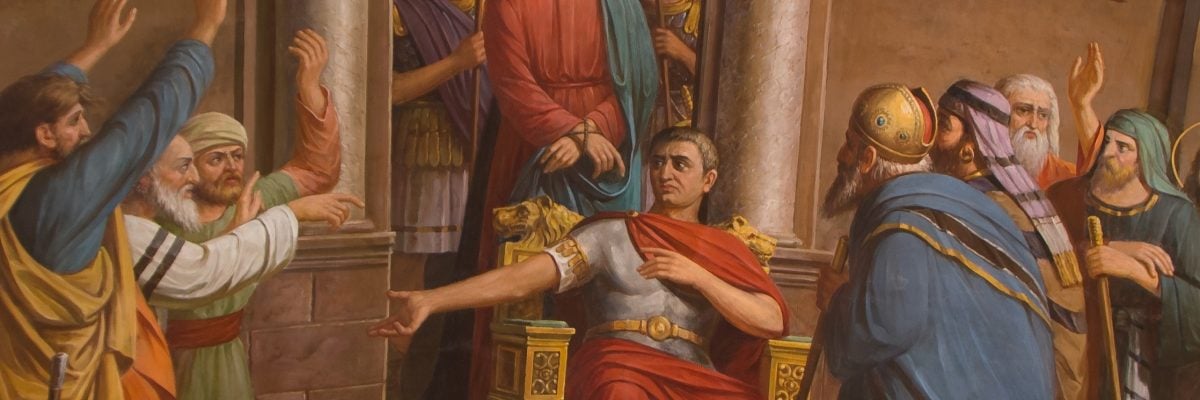
John the Baptist and Jesus Christ led seemingly parallel lives: from their conceptions (each announced by the angel Gabriel) to their public ministry (proclaiming the need to repent, believe, and be baptized) to their arrest and execution by the secular rulers of their day. John is arrested and eventually executed by King Herod of Galilee (the son of the Herod who unsuccessfully tried to kill Jesus). As a Galilean, Jesus also appears briefly before Herod, but his trial is largely conducted by Pontius Pilate, the Roman prefect of Judea.
It’s no coincidence that Herod’s life and Pilate’s are also intimately bound up with the other’s. St. Luke mentions that, after the trial of Jesus, “Herod and Pilate became friends with each other that very day, for before this they had been at enmity with each other” (Luke 23:12). And in each case, we might say that it’s really Pilate and Herod who get put on trial.
Why? Because these two allegedly powerful men each have before them a man they personally know to be innocent, a man that they want not to execute. Whether they know it or not, this is the most important moment in each man’s life, the moment for which he will be remembered for all of history.
For King Herod, the moment comes with John the Baptist. The relationship between John and Herod is a complex one. “Herod feared John, knowing that he was a righteous and holy man, and kept him safe. When he heard him, he was much perplexed; and yet he heard him gladly” (Mark 6:20). So why does Herod consent to the arrest of a man he knows to be not only innocent but holy? Because he is too cowardly to stand up to his own mistress. “For Herod had sent and seized John, and bound him in prison for the sake of Herodias, his brother Philip’s wife; because he had married her” (Mark 6:17).
It’s Herodias, not Herod, who “had a grudge against him, and wanted to kill him” (Mark. 6:19). She ultimately uses her own daughter to tantalize Herod until he puts himself in a compromising position by declaring that he’ll give the girl anything she desires. At her mother’s urging, she famously asks for the head of John the Baptist on a platter (Mark 6:25), and the Evangelist tells us that “the king was exceedingly sorry; but because of his oaths and his guests he did not want to break his word to her.”
Herod knows what’s right but caves to his craven need to appease his mistress and his guests. His weakness is that he wants so badly to appear strong, and Herodias knows how to manipulate this. What he sees as a show of strength and a face-saving measure is the opposite: a betrayal of his principles and a publication of his moral weakness. On paper, Herod is king. In reality, he’s too weak to stand up for what he believes in, and so he’s easily led around like Herodias’ pet.
In the arrest and execution of Jesus, Pontius Pilate is similarly on trial. Pilate’s relationship with Jesus is similar, in that he doesn’t believe for a moment that Jesus is actually guilty—declaring “I find no crime in him” (John 18:28, 19:4). He’s confirmed in this judgment by his wife, who sends word for him on the judgment seat to say “Have nothing to do with that righteous man, for I have suffered much over him today in a dream” (Matt. 27:19). Pilate literally attempts to wash his hands of the affair while stating, “I am innocent of this righteous man’s blood; see to it yourselves” (Matt. 27:24).
At times, Pilate even seems mildly interested in this Jesus before him. When Jesus proclaims, “For this I was born, and for this I have come into the world, to bear witness to the truth. Everyone who is of the truth hears my voice,” Pilate responds by asking “What is truth?” (John 18:37-38). And yet as the Nicene Creed reminds us, Jesus “was crucified under Pontius Pilate.” Why is Pilate complicit in the death of the King of the Jews? Because “all the chief priests and the elders of the people took counsel against Jesus to put him to death; and they bound him and led him away and delivered him to Pilate the governor” (Matt. 27:1-2).
It these men who want Jesus dead. Pilate is just a pawn in their game. What’s more, he knows it, recognizing that “it was out of envy that they had delivered him up” (Matt. 27:18).
But just as he sees through the chief priests and elders, they see through him, recognizing him as a spineless politician only concerned on maintaining power. They ultimately use this against him, declaring in front of the crowds, “If you release this man, you are not Caesar’s friend; everyone who makes himself a king sets himself against Caesar” (John 19:12). Like Herod, Pilate knows what’s right but caves to the demands of the crowd. His ambition is his weakness, and the chief priests and elders know how to manipulate him.
Another bond links Pilate and Herod, in that neither of them caves in right away. Instead, each man initially holds tough, but his will ultimately fails. Why? They each compromised with evil.
Long before Herod has John killed, he compromises himself by arresting a man he knows to be innocent. Before Pilate completely crumbles, he had Jesus scourged and crowned with thorns, as an attempt to compromise with the crowds. But a compromise with evil is still evil. As Christ warns the church of Laodicea, “I know your works: you are neither cold nor hot. Would that you were cold or hot! So, because you are lukewarm, and neither cold nor hot, I will spew you out of my mouth” (Rev. 3:15-16). We see this clearly in the terms Pilate proposes to the crowds:
“You brought me this man as one who was perverting the people; and after examining him before you, behold, I did not find this man guilty of any of your charges against him; neither did Herod, for he sent him back to us. Behold, nothing deserving death has been done by him; I will therefore chastise him and release him” (Luke 23:14-16).
Immediately after Pilate declares Jesus’ total innocence, he announces his willingness to “chastise” the innocent Jesus anyway. At this point, it’s clear that Pilate has already lost the battle, just as Herod before him. These men’s failings are a reminder to each of us to avoid not only mortal sins, but even venial ones, and even situations that seem likely to lead us into sin.
Virtue comes from the Latin virtus, meaning “manliness,” and it’s a reminder that true strength is living virtuously. In the eyes of the world, secular rulers like Pilate and Herod seem strong, while the meekness of John and Jesus is mistakeable for weakness. But the reality is quite otherwise.
Herod can throw all the lavish parties he likes and Pilate can marshal Roman legions to his heart’s content, but neither man shows himself to be truly strong in his time of trial. In the moment when it counts, neither can do the right thing, even though it’s what each of them personally wants to do. Their attachment to lust or power or popularity was enough to weaken them to their own disgrace.
It’s easy to see echoes of these cowardly rulers in modern politicians. After all, Herodias and the chief priests were sort of the “special interest groups” of their day, and Pilate and Herod resemble nothing so much as those elected leaders who are “personally opposed” to killing but are too beholden to special interests to stand up for innocent human life. But at the climax of this Holy Week, perhaps it would be more fruitful to turn the gaze inward: which are the sinful attachments that weaken our ability to live strong lives of principle, virtue, and holiness?



